When Sara met Ray, it felt like love at first sight. They quickly moved in together and spent all their time together. Ray, however, didn’t seem to trust Sara. He was always asking Sara where she was going and often made her feel ashamed. Sometimes he’d get physically violent. Sara didn’t know what to do, and as a trans woman and immigrant, she was scared that she would experience discrimination or something worse if she sought out help.
Violence is at its core an issue of power, where one person uses their privilege to gain and maintain control over another through ongoing violence, coercion, and manipulation. This Pride Month, we want to dispel the myth that domestic violence only happens in heterosexual, cisgender relationships. Fifty-four percent of respondents to the 2015 US Transgender Survey report having experienced some form of intimate partner abuse, and 48 percent report having been sexually assaulted. These alarming numbers are part of a larger and disturbing problem: the overwhelming amount of violence perpetrated against transgender women. In 2019, at the date of publication of this piece, at least 10 transgender individuals have been killed -- and all 10 of these victims have been black trans women. In the past week alone, Zoe Spears was murdered just outside Washington DC, just a few blocks away from where her friend Ashanti Coleman was shot in March. Both were trans black women, and both were sex workers.
The spate of violence against trans women in the US is deeply concerning and also extends to the way trans women are treated in their intimate relationships. Community violence and intimate partner violence (IPV) are inherently linked, with research showing that perpetrators of IPV are more likely to have engaged in some form of community violence themselves. Violence as a way to demonstrate power over another person is learned at home, in private, and in our communities -- and it’s used by people with more privilege to assert themselves over individuals whose identities deviate from what society sees as “normal.”
A trans woman’s gender identity interacts with all other parts of her life, and can make it so she’s more vulnerable to experiencing violence of all kinds. From bathroom bills to “trans panic” laws to the pathologization of trans identities in medical settings, trans women experience stigmatization that sits at the complicated intersection of misogyny and transphobia. Adding other forms of oppression to the mix, such as racism, homophobia, or biphobia, increases the vulnerability of trans women to experiencing violence.
This stigmatization is not without tangible effects -- in 2013, 72 percent of the victims of LGBT or HIV-motivated hate violence homicides were trans women. Because of the many barriers to accessing it, trans women are less likely to have access to regular medical care. They are also less likely to disclose relationship violence when asked by a medical professional, even though trans women are more susceptible to adverse physical and mental health outcomes than cisgender individuals. In a survey of transgender individuals, respondents reported an unemployment rate that was 3 times the national average, and 1 in 6 respondents reported losing a job due to their gender expression. Respondents also reported higher than average rates of homelessness and significantly lower earning power. Beyond the challenges these statistics present at face values, it is also important to recognize that these types factors can also lead to increased engagement in the survival crimes, such as sex work or theft, to generate an income, which leads to increased interaction with the police -- who many trans women distrust due to historic and well-documented abuse at the hands of law enforcement.
We have a long way to go in helping reduce the barriers that trans women face when attempting to access services and safety when experiencing domestic violence. Our understanding of the challenges trans women face are deepened by lack of available data and information. We have seen that far too often, “in studies addressing domestic violence in LGBT communities, the “T” is tacked on at the end as an afterthought.”
There are many reasons trans women may experience domestic violence at such high rates. At La Casa, we recognize the experiences of trans survivors are different from those of cisgender survivors. Regardless of your gender identity or life experiences, you are entitled to safety, autonomy, and loving relationships.
When Sara came home after work one day, Ray was angry that she hadn’t told her where she’d been. He began yelling at her and punched her in the face. Sara came to La Casa’s drop-in center the next day and was able to stay at our confidential shelter. Our case managers helped her find a support group for trans women, and worked with her to find new housing so she wouldn’t have to live with Ray any longer.
La Casa de las Madres supports survivors 24 hours a day, 7 days a week, 365 days a year. Call La Casa’s 24/7 hotline at 1-877-503-1850, or message our text line at 415-200-3575, for support. For trans-specific support, call the Trans Lifeline at 1-877-565-8860.

